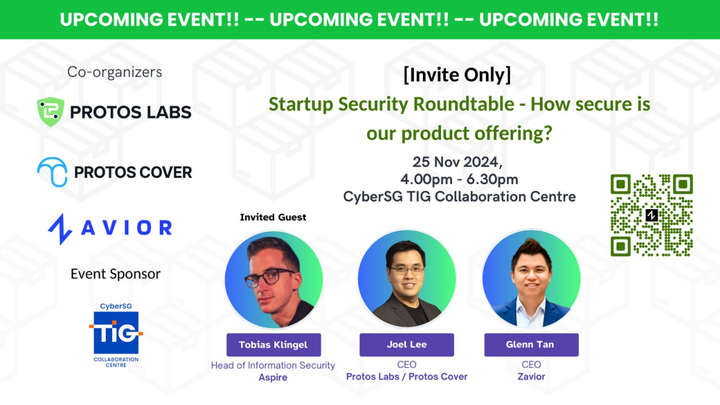Startup Security Roundtable
 Tech leaders and founders discussing security at the Startup Security Roundtable.
Tech leaders and founders discussing security at the Startup Security Roundtable.
Key Insights for Tech Co-Founders
Driving the Security Conversation in the Startup Ecosystem
Yesterday marked a significant step in fostering a stronger security culture within the tech startup community. Industry leaders and tech co-founders convened to address the crucial topic of cybersecurity at the Startup Security Roundtable. This gathering, a collaborative effort by CyberBoost programme, Protos Labs, and Zavior, hosted at the CyberSG TIG Collaboration Centre, featured 🏃Tobias Klingel, Head of Information Security at Aspire and Cyber Risk Committee member at the Singapore FinTech Association (SFA).
The event witnessed enthusiastic participation and open discussions, highlighting the commitment of tech companies, both large and small, to building secure products and services from the ground up. Participants explored the challenges and actionable strategies for integrating robust security practices into their ventures.

Key Takeaways for Secure Startup Growth
The roundtable generated several impactful insights, offering practical guidance for tech startups navigating the complexities of cybersecurity:
1. Security by Design is Critical yet Challenging
Integrating security from the initial design phase is paramount. Industry best practices, such as threat modeling and secure coding guidelines, are crucial for proactively minimizing vulnerabilities. Data shows that addressing security early in the development lifecycle is significantly more cost-effective than remediating issues post-deployment.
2. Strong Leadership Support is Key to Success
Cybersecurity must be a priority driven from the top. Leadership commitment ensures that security initiatives receive adequate resources, budget, and are embedded into the company culture. Studies consistently demonstrate that companies with strong leadership involvement in security experience fewer breaches and faster incident response times.
3. Find the Right Balance Between Off-the-Shelf and Custom Solutions
Startups should strategically evaluate when to leverage readily available security tools and when to invest in custom solutions.
- Off-the-shelf solutions offer speed and ease of implementation for common security needs.
- Custom solutions may be necessary to address unique business requirements and specific threat landscapes.
A balanced approach optimizes both cost-efficiency and security posture.
4. Keep Production and Testing Environments Strictly Separate
Maintaining strict separation between production and testing environments is a fundamental security principle. This isolation prevents accidental data leaks, unauthorized access, and ensures the integrity of both development and live systems.
Industry standards like ISO 27001 and NIST Cybersecurity Framework emphasize environment segregation as a core security control.
5. Ensure that Security Aligns with Business Value
Security should not be treated as a purely technical concern, but as an enabler of business objectives.
- Demonstrating a strong security posture builds customer trust.
- Enhancing security improves brand reputation.
- A well-implemented security strategy can be a competitive differentiator.
Aligning security investments with tangible business outcomes ensures sustainable security practices.

Discussion Points: Addressing Real-World Security Challenges
The roundtable also delved into practical questions and challenges faced by tech co-founders, including:
- Implementing Security By Design in Early Product Stages
Strategies for incorporating security considerations from the outset, even with limited resources and rapid development cycles. - Security Responsibilities for COOs and CTOs
How non-security executive roles can effectively manage security before hiring a dedicated CISO. - Immediate “Must-Do” and “Straight No-Nos” in Software Security
Actionable steps and critical mistakes to avoid when securing software development. - Hiring the Right Engineers and Software Development Partners
Identifying security skillsets and evaluating the security practices of potential technology partners. - Upfront and Long-Term Risk Management
Proactive risk assessment and evolving security strategies as the startup grows. - Cyber Insurance as a Security Option
Understanding the role and benefits of cyber insurance for startups. - Incident Response and Backup Plans
Preparing for potential security incidents and establishing robust recovery procedures.

Building a Secure Tech Future Together
The Startup Security Roundtable underscored the commitment of the tech startup community to prioritize cybersecurity. By sharing knowledge, experiences, and actionable strategies, events like these are crucial for raising the bar for safer and smarter technology.
